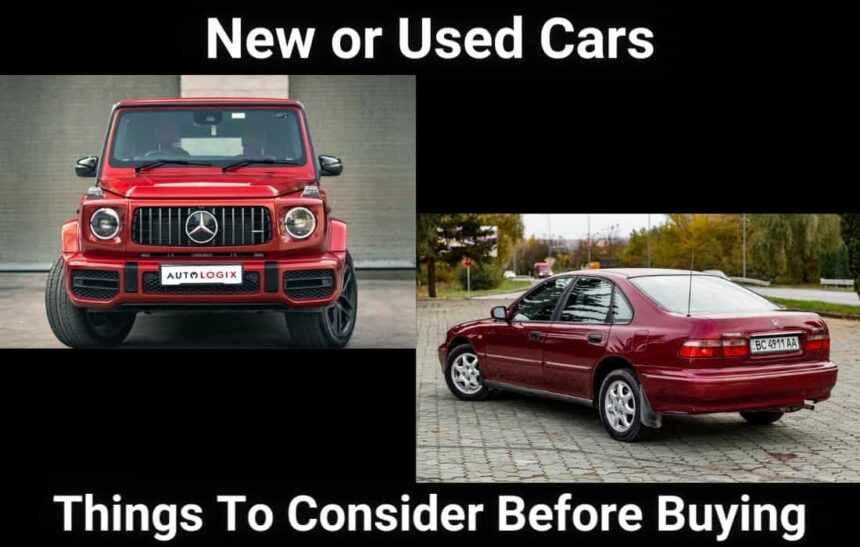Buying new or used cars will always be considered a big decision and an expensive one at that. Owning a car is still a big dream for many all over the world and also in my home country Nigeria, the number of first-time car buyers has skyrocketed in the last decade, thanks to the increase of tech startups, fintech and the increase in per capita income easy car buying options and a lot of other helpful car options available to the masses.
For some of us we end up asking ourselves which car will better fit our needs and budget, should we go for a new or used car? A lot of question goes through our mind that needs to be answered, well if you think back about the time getting a good used car was a big challenge, and that further increases our curiosity. Well leave that question for us to answer, today I will be sharing with you things to consider before getting a new or used car.
New Or Used Car: Which is Suitable For You

Deciding whether to buy a new or used car depends on your personal preferences, budget, and needs. Here are some factors to consider:
- Budget: Your budget is a significant factor in deciding whether to buy a new or used car. A new car will typically cost more than a used car. However, if you’re financing the car, the monthly payments on a new car may be more manageable than those on a used car with a higher interest rate.
- Depreciation: A new car loses a significant portion of its value as soon as you drive it off the lot. On the other hand, a used car has already experienced this initial depreciation, which means it may be a better value in the long run.
- Maintenance and Repair Costs: New cars typically come with warranties that cover the cost of repairs and maintenance for a set period, while used cars may have higher maintenance and repair costs. However, newer cars may require more expensive maintenance and repair work, while older cars may require more frequent maintenance.
- Features: New cars usually come with the latest features, such as advanced safety technology, infotainment systems, and other modern amenities. If having the latest features is important to you, a new car may be a better choice. However, many used cars may still have these features, depending on their age and condition.
- Financing Options: Financing rates for new cars are often lower than for used cars. If you’re financing the purchase, this may make a new car more affordable than a used car with a higher interest rate.
In summary, a new car may be a better option if you have the budget for it, want the latest features, and don’t mind the initial depreciation. A used car may be a better option if you want to save money, don’t mind older features, and want to avoid the initial depreciation that comes with a new car. Ultimately, the decision comes down to your personal preferences, budget, and needs.
Advantages Of Buying A New Car

Buying a new car has several advantages, including:
- Reliability: A new car is less likely to break down or require repairs than a used car, especially if you properly maintain it. This can save you money in the long run on maintenance and repair costs.
- Latest Technology: A new car comes with the latest technology, including advanced safety features, infotainment systems, and other modern amenities. This can improve your driving experience and make your car more enjoyable to own.
- Warranty Coverage: A new car comes with a manufacturer’s warranty that covers the cost of repairs and maintenance for a set period. This can give you peace of mind knowing that you won’t have to pay out of pocket for unexpected repairs.
- Customization: When you buy a new car, you can choose the exact make, model, colour, and options that you want. This allows you to create a car that fits your needs and preferences perfectly.
- Financing Options: Financing rates for new cars are often lower than for used cars, which can make a new car more affordable in the long run. Additionally, new car buyers may qualify for incentives and rebates that can further reduce the purchase price.
- Resale Value: A new car will typically have a higher resale value than a used car, which means you may be able to recoup more of your investment if you decide to sell it in the future.
Overall, buying a new car can provide a reliable, enjoyable driving experience with the latest technology and customization options, as well as warranty coverage, financing options, and a higher resale value.
Disadvantages Of Buying A New Car
Buying a new car has several disadvantages, including:
- Higher Cost: New cars are typically more expensive than used cars, and their value depreciates significantly as soon as you drive them off the lot. This can make it harder to afford the car and may not provide the best value for your money.
- Higher Insurance Premiums: New cars often come with higher insurance premiums due to their higher value and cost to repair or replace in the event of an accident.
- Higher Taxes and Fees: In addition to the purchase price, new cars often come with higher taxes and fees, such as sales tax, registration fees, and licensing fees.
- Limited Selection: When buying a new car, your options may be limited to the current year’s models or those in the dealer’s inventory. This may limit your ability to find the exact car you want.
- Potential for Recalls: As new cars are released, manufacturers may discover issues that require a recall or other repairs. This can be an inconvenience and may require you to take the car in for service.
- Higher Depreciation: New cars experience rapid depreciation, meaning their value drops quickly after purchase. This can result in a significant loss of value if you decide to sell the car in the future.
Overall, buying a new car can come with a higher cost, insurance premiums, taxes, and fees, as well as the limited selection and the potential for recalls. Additionally, new cars experience rapid depreciation, which can result in a significant loss of value if you decide to sell the car in the future.
Advantages Of Buying A Used Car

Buying a used car has several advantages, including:
- Lower Cost: Used cars are generally less expensive than new cars, which can make them more affordable for those on a budget. Additionally, the initial depreciation that new cars experience means that used cars can offer better value for your money.
- Lower Insurance Premiums: Used cars often have lower insurance premiums than new cars due to their lower value and lower cost to repair or replace in the event of an accident.
- Lower Taxes and Fees: Used cars often come with lower taxes and fees, such as sales tax, registration fees, and licensing fees, which can save you money.
- Wider Selection: When buying a used car, you have a wider selection of make, model, and year options. This allows you to find a car that fits your needs and preferences more easily.
- Reduced Depreciation: Used cars have already experienced the initial depreciation that new cars experience, which means that their value is more stable over time. This can help you get a better return on your investment if you decide to sell the car in the future.
Overall, buying a used car can provide a more affordable option with lower insurance premiums, taxes, and fees, a wider selection of options, and reduced depreciation. Additionally, vehicle history reports can provide valuable information to help you make an informed purchasing decision.
Disadvantages Of Buying A Used Car
Buying a used car has several disadvantages, including:
- Higher Maintenance Costs: Used cars are more likely to require maintenance and repairs than new cars, which can result in higher costs over time. This is especially true if the car is older and has higher mileage.
- Unknown Condition: When buying a used car, it can be difficult to know the car’s full history, including any accidents or major repairs it may have undergone. This can make it challenging to assess the car’s condition and potential maintenance costs.
- Limited Warranty: Used cars typically come with a limited warranty, if any, which means that you may have to pay for repairs out of pocket. Additionally, many warranties may not cover all of the necessary repairs, leaving you with unexpected expenses.
- Higher Interest Rates: Financing rates for used cars are often higher than for new cars, which can make a used car more expensive in the long run.
- Lower Resale Value: Used cars have already experienced depreciation, which means that their resale value is often lower than that of a new car. This can result in a lower return on investment if you decide to sell the car in the future.
- Less Advanced Technology: Used cars may not have the latest technology or safety features that newer cars offer, which can impact your driving experience and safety.
Overall, buying a used car can result in higher maintenance costs, an unknown condition, limited warranty, higher interest rates, lower resale value, and less advanced technology. However, by doing your research, obtaining a vehicle history report, and having the car inspected by a qualified mechanic, you can check some of these risks and make a more informed purchasing decision.
Difference Between The Depreciation Of a New Car And A Used Car
Depreciation refers to the decrease in the value of a car over time. The depreciation of a new car is generally higher than that of a used car, due to several factors:
- Initial Depreciation: When a new car is driven off the lot, it immediately loses value due to the initial depreciation. This can be as much as 20% of the car’s value in the first year alone.
- Technology and Features: New cars often come with the latest technology and features, which can quickly become outdated as new models are released. This can result in a faster rate of depreciation for new cars.
- Condition: Used cars may have higher mileage or show more wear and tear, which can impact their value. However, well-maintained used cars may not experience as much depreciation as new cars.
- Supply and Demand: The demand for new cars may be higher than the supply, which can result in higher prices and slower depreciation. Conversely, the supply of used cars may be higher than the demand, which can result in lower prices and faster depreciation.
In general, new cars tend to experience higher depreciation compared to used cars due to factors such as initial depreciation, technology and features, as well as supply and demand. As a result, opting for a used car may provide better value in the long term as it may not undergo such a rapid depreciation as a new car.
New Economic Car Vs Used Luxury Car
When deciding between a new economy car and a used luxury car, your personal preferences and financial circumstances will ultimately dictate your choice. Here are some factors that you should take into account:
- Budget: If your budget is limited, a new economic car may be a better option as it will likely be more affordable than a used luxury car.
- Maintenance Costs: Luxury cars often come with higher maintenance costs due to their advanced technology and features. A new economic car may have lower maintenance costs in the long run, as it will not require as much upkeep.
- Resale Value: Luxury cars may have a higher resale value compared to economic cars, due to their higher initial cost and potential for classic car status. However, this also depends on the condition and age of the car.
- Features and Technology: Luxury cars often come with advanced technology and features that may not be available on an economical car, even if it is new. If you value these features, a used luxury car may be a better option.
- Safety: Luxury cars often come with more advanced safety features than economical cars. If safety is a top priority for you, a used luxury car may be a better option.
- Fuel Efficiency: Economic cars are often more fuel-efficient than luxury cars, which can save you money on gas in the long run.
In general, if you’re on a budget and prioritize lower maintenance costs, resale value, and fuel efficiency, a new economical car may be a more suitable option. On the other hand, if you prioritize advanced features, safety, and potential resale value in a classic car, a used luxury car might be a better fit. Nevertheless, conducting thorough research and weighing all factors is crucial before reaching a decision.
How To Choose Between a New or Used Car
When deciding whether to opt for a new or old car, several factors such as your budget, driving requirements, personal preferences, and circumstances need to be taken into account. Here are some factors that you should consider before making a decision:
- Budget: The first thing to consider is your budget. New cars are generally more expensive than used cars, so if you have a limited budget, you might want to consider a used car.
- Depreciation: A new car can depreciate up to 20% in the first year alone, while used cars tend to have already experienced their biggest depreciation hit. So if you’re looking for a vehicle with lower depreciation, used cars might be the better option.
- Maintenance and Repairs: New cars are less likely to need repairs in the short term, but used cars may require more maintenance and repairs. You should factor in the potential maintenance and repair costs when deciding between a new or used car.
- Fuel Economy: Newer cars are generally more fuel-efficient than older cars, so if you’re concerned about gas mileage, a new car might be the better choice.
- Safety Features: Newer cars tend to come with the latest safety features such as lane departure warning, blind-spot monitoring, and automatic emergency braking. If safety is a top priority, a new car might be the better option.
- Personal Preferences: Ultimately, the decision between a new car and an old car comes down to personal preferences. If you prefer the latest features, are willing to pay for them, and don’t mind the extra expense, a new car might be the right choice for you. On the other hand, if you prefer a classic car or have a tight budget, a used car might be the better option.
Conclusion
Ultimately, the choice of which car to go for comes down to your individual needs and preferences. Both new and used cars have their advantages and disadvantages, and as long as you find a car that you are satisfied with, it shouldn’t matter whether it is new or used.










